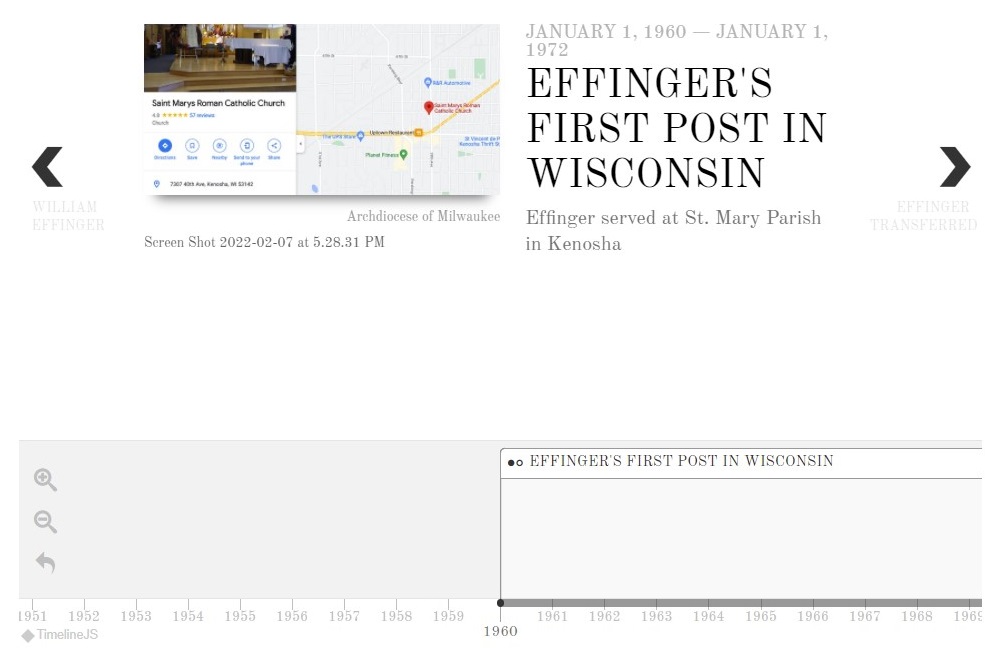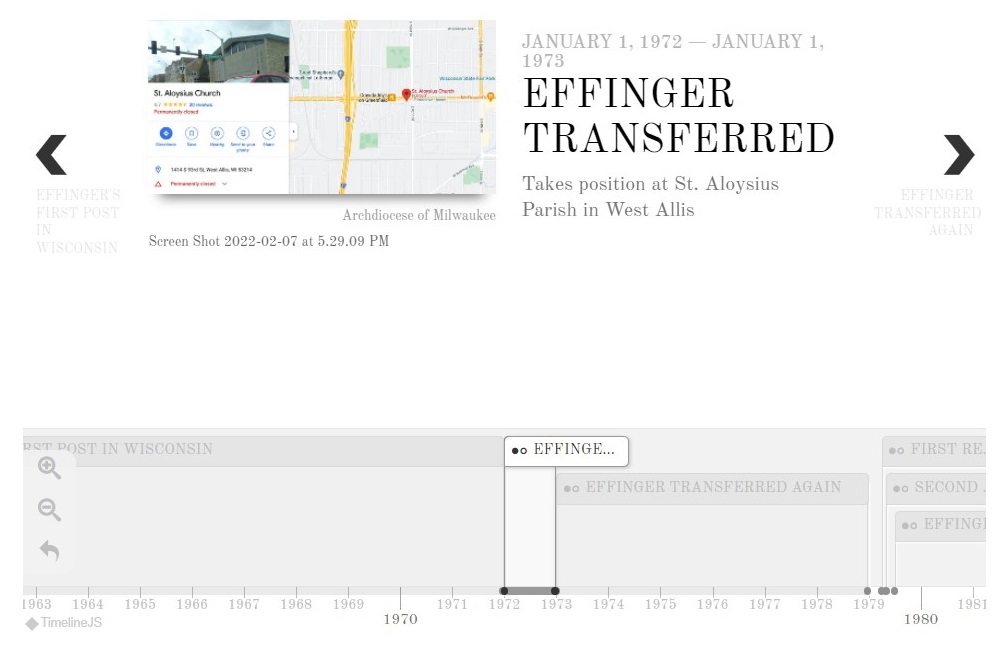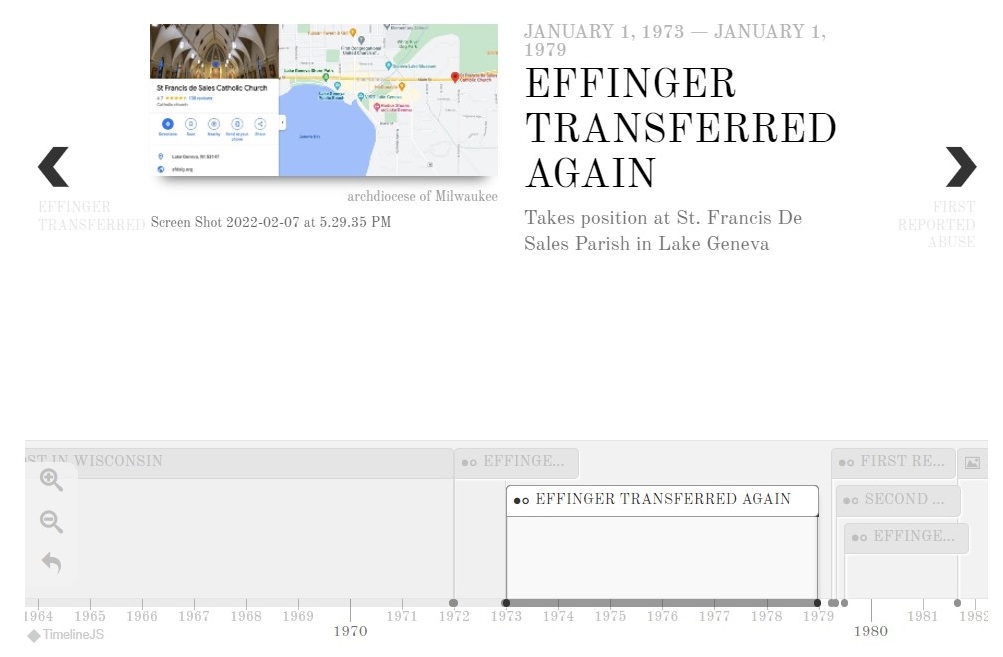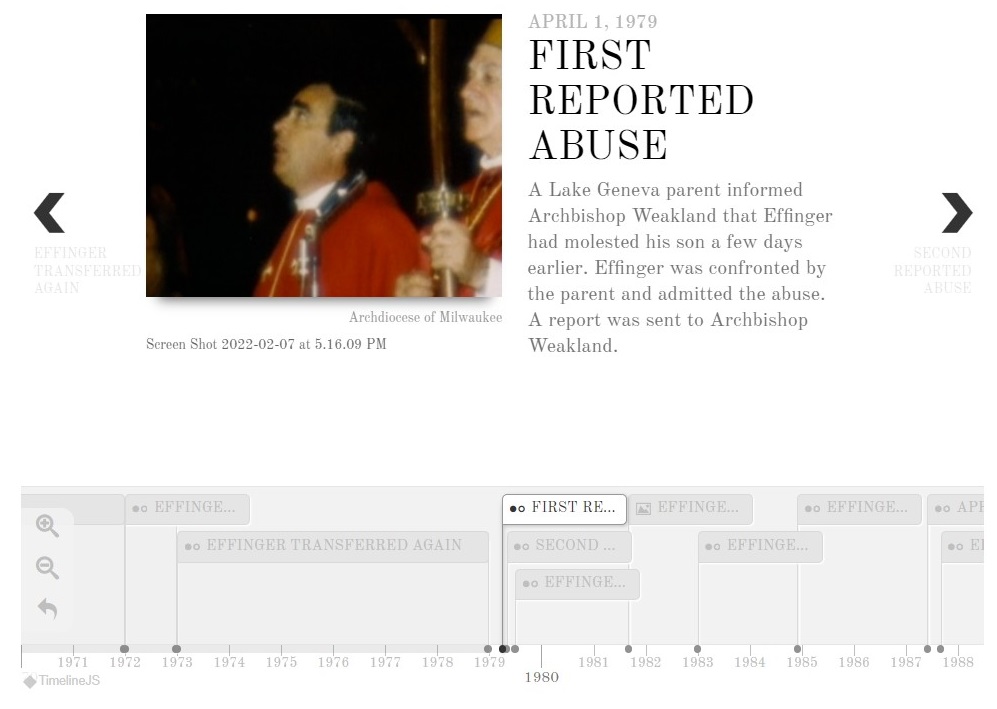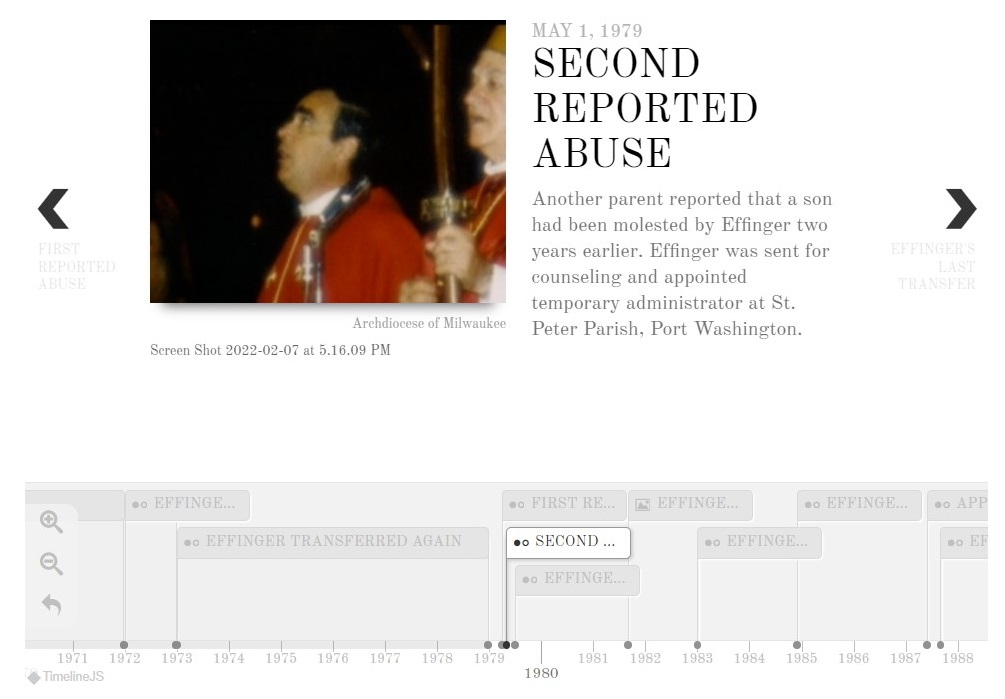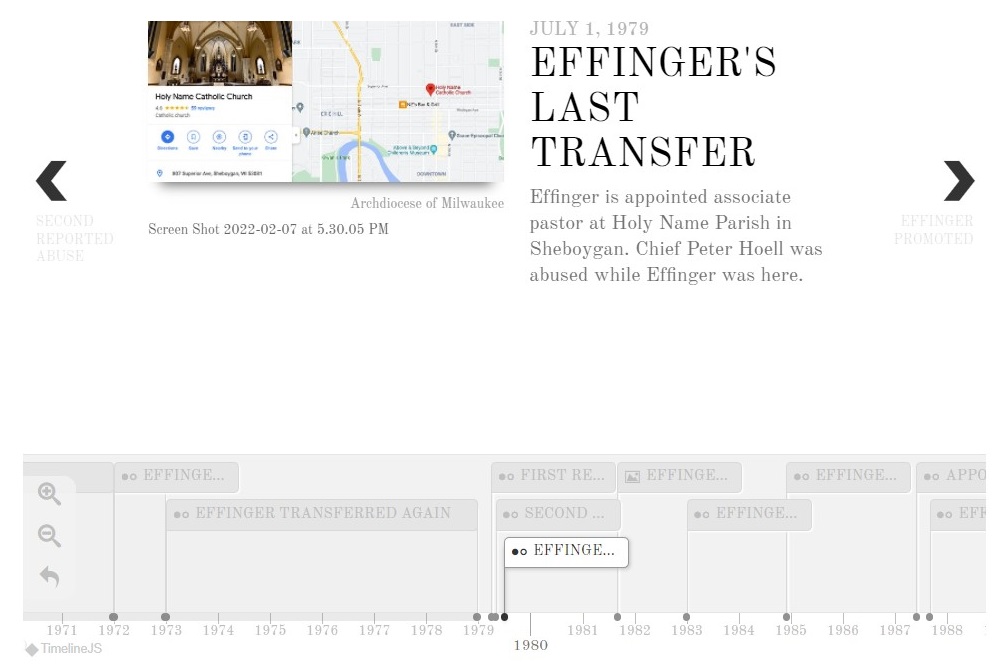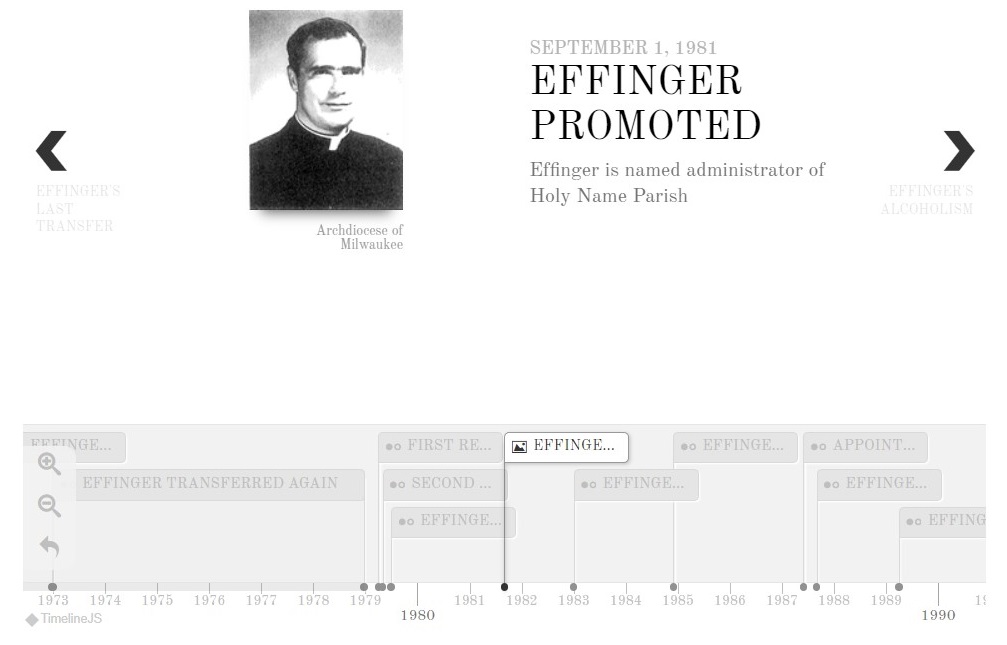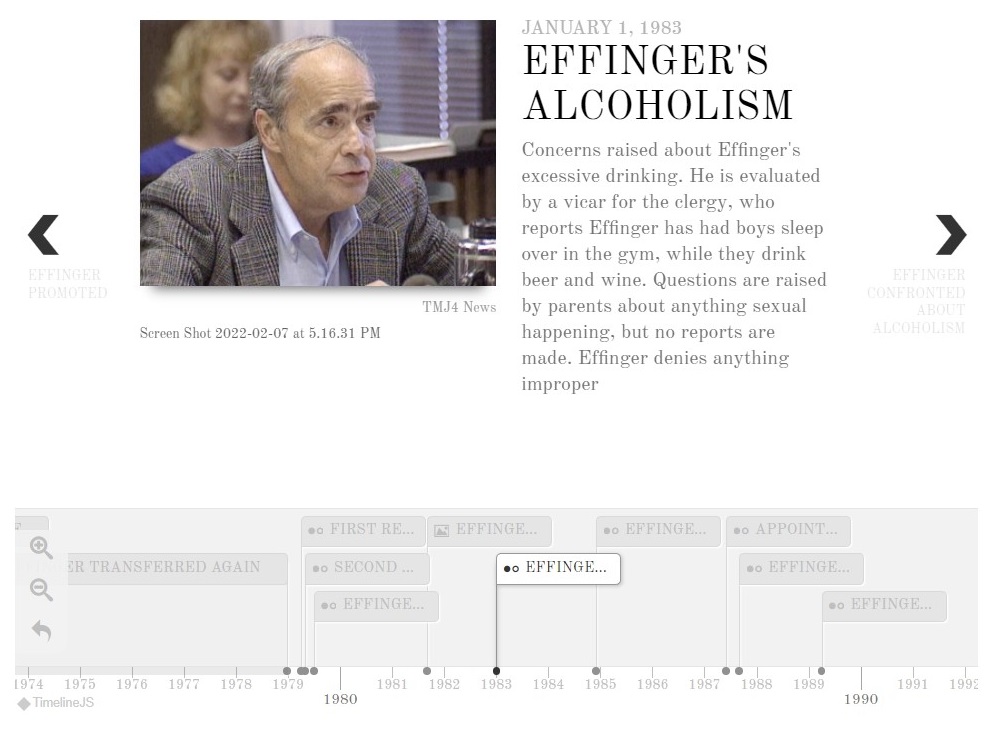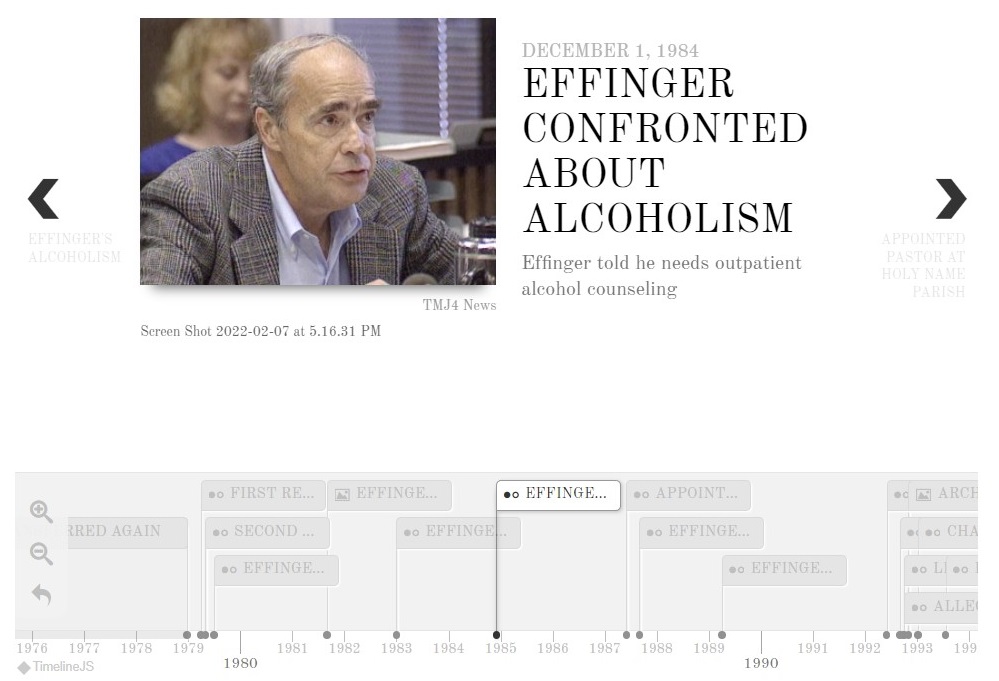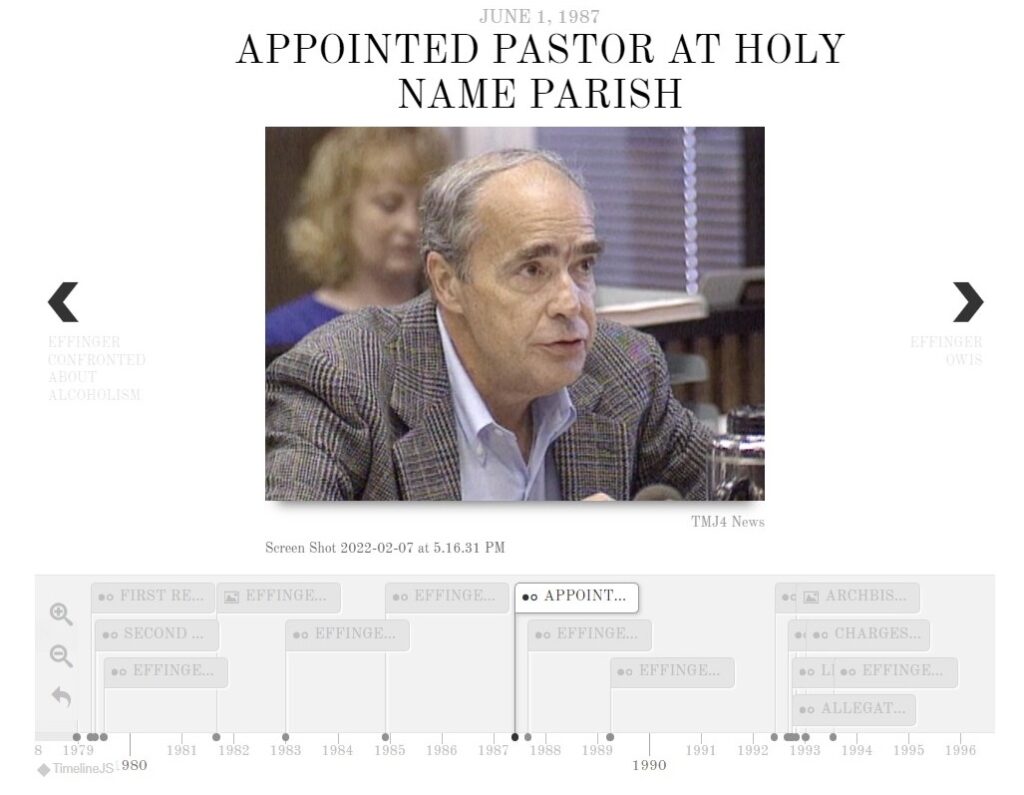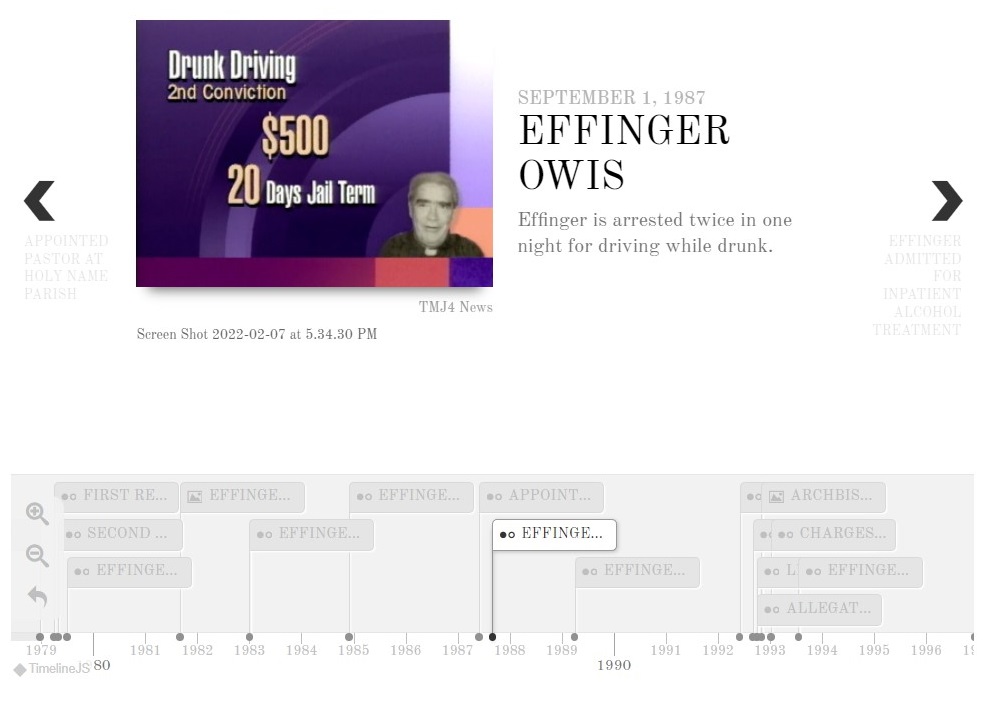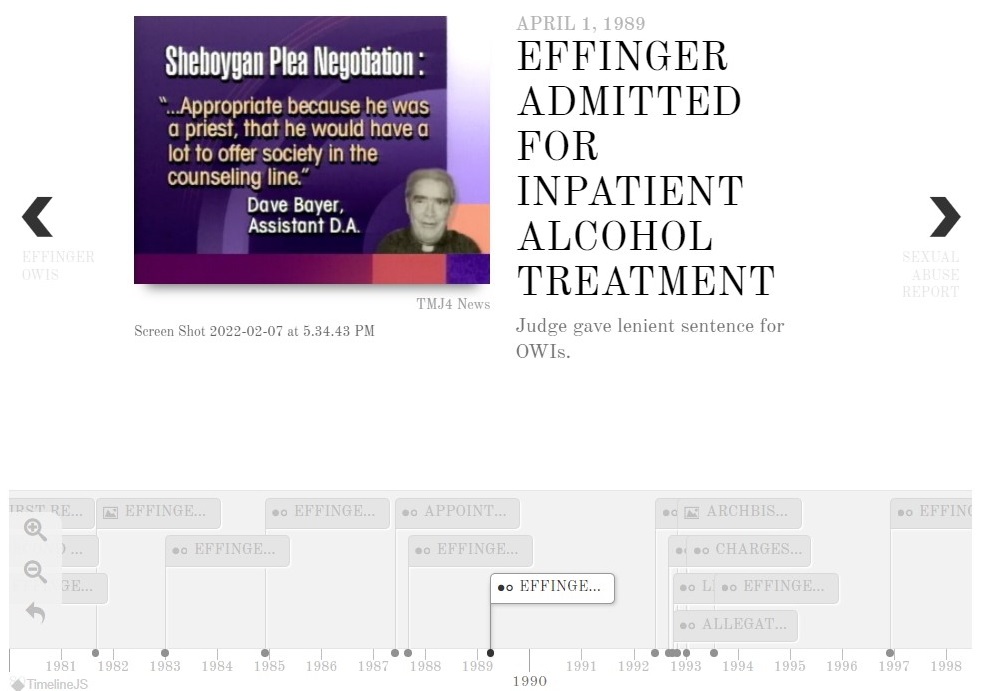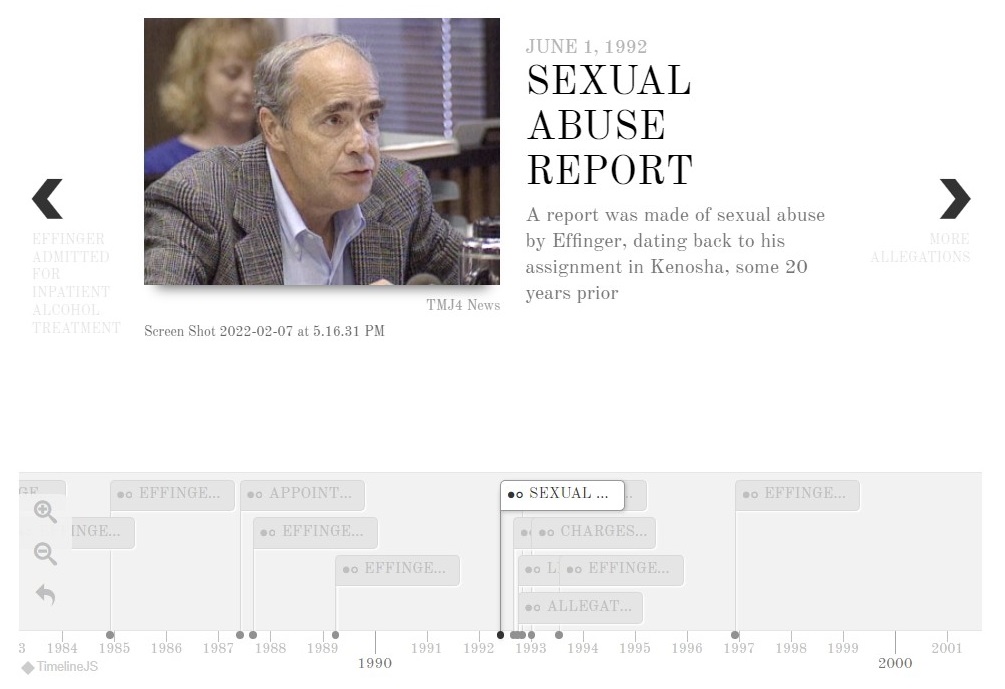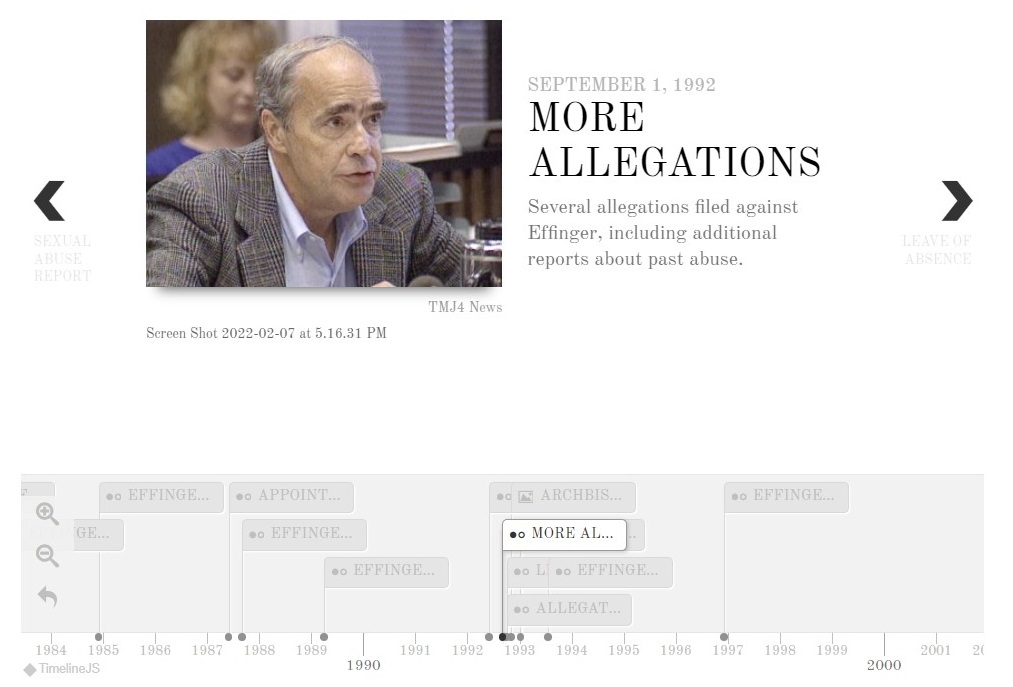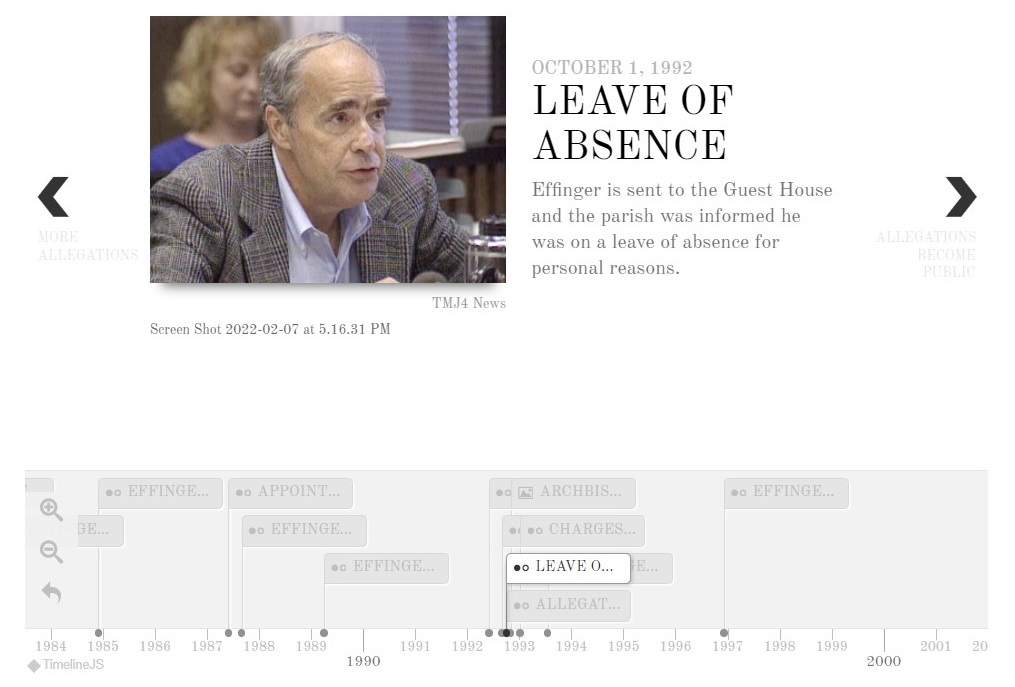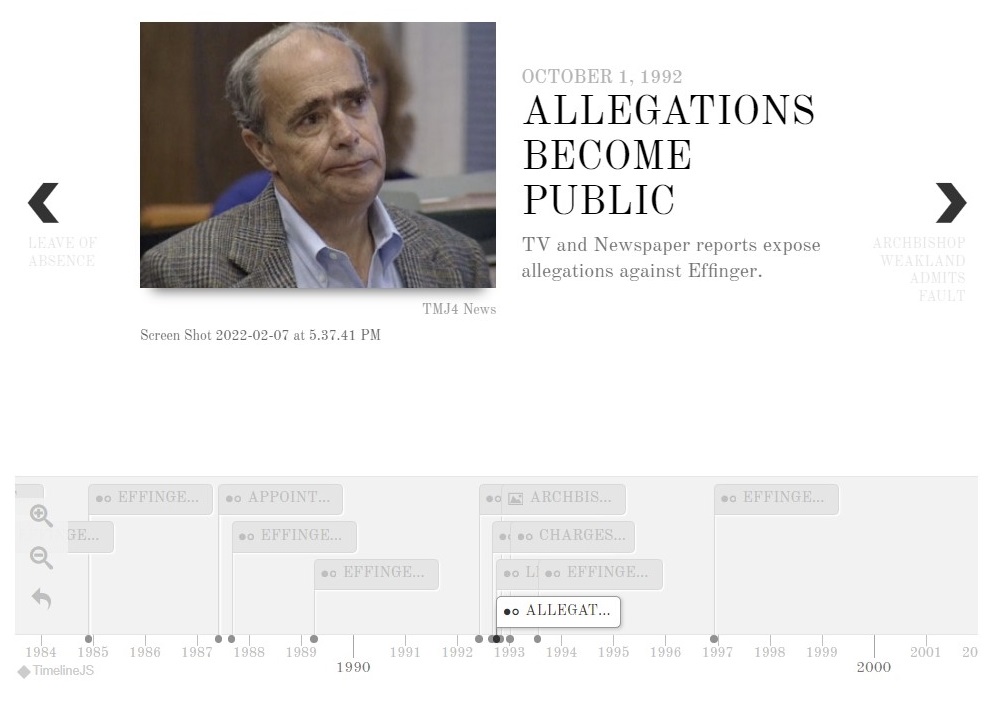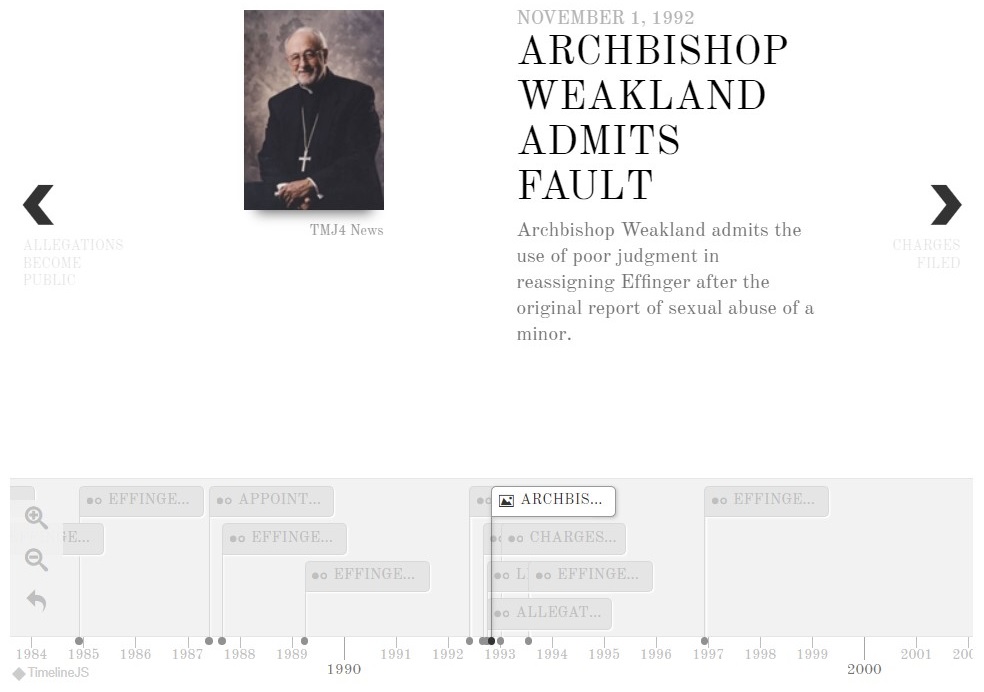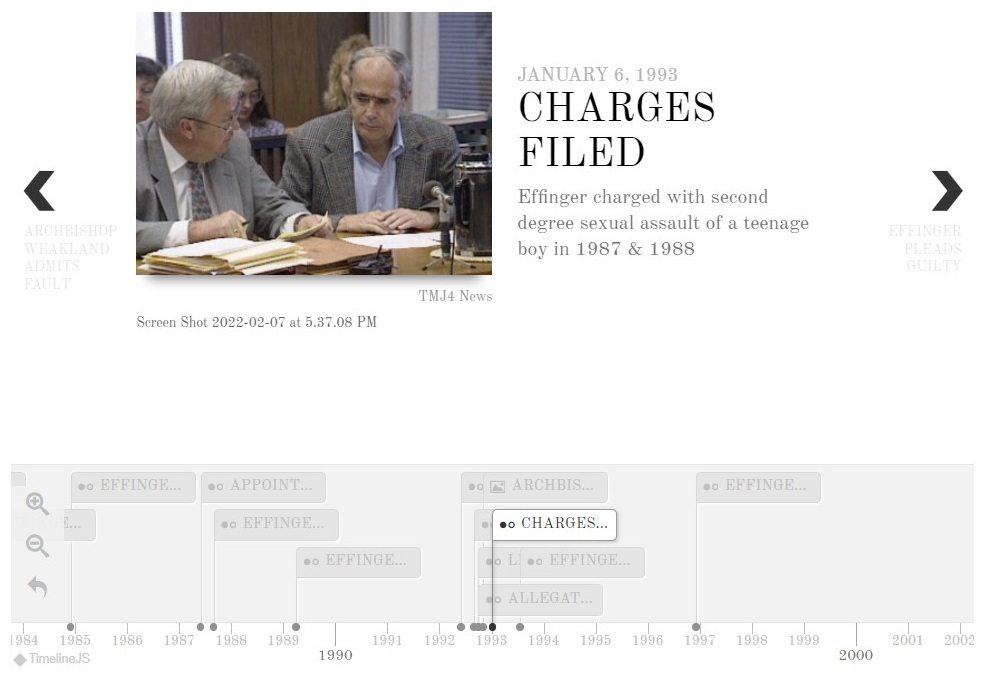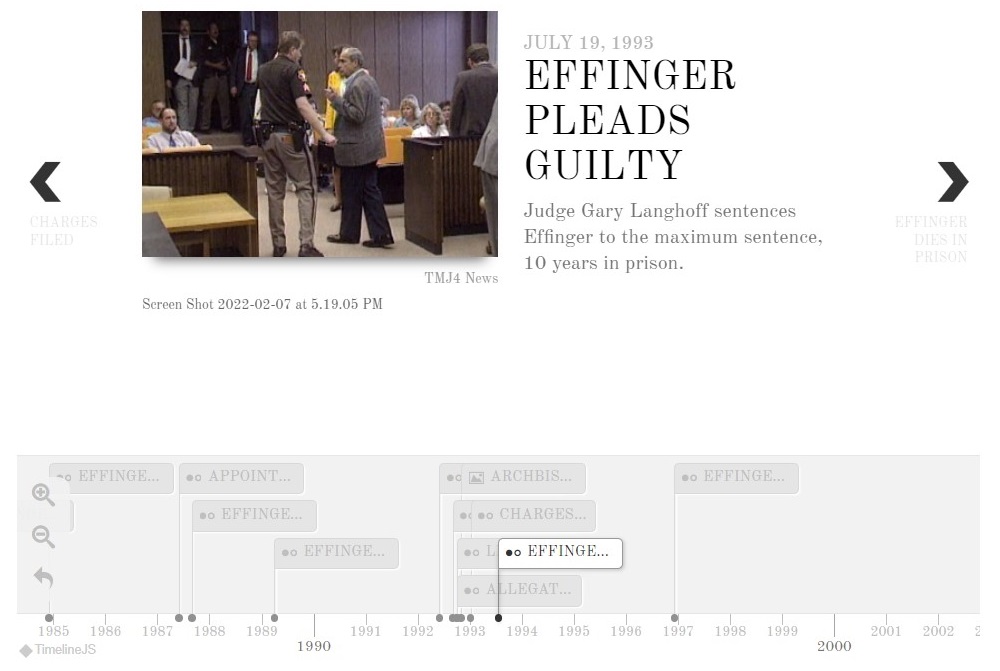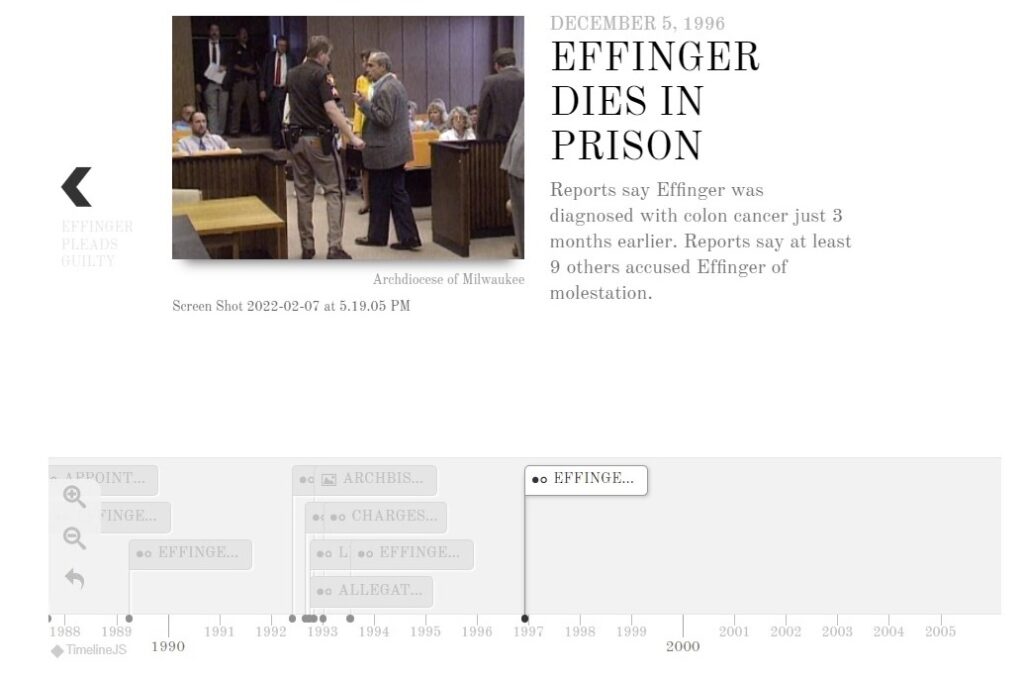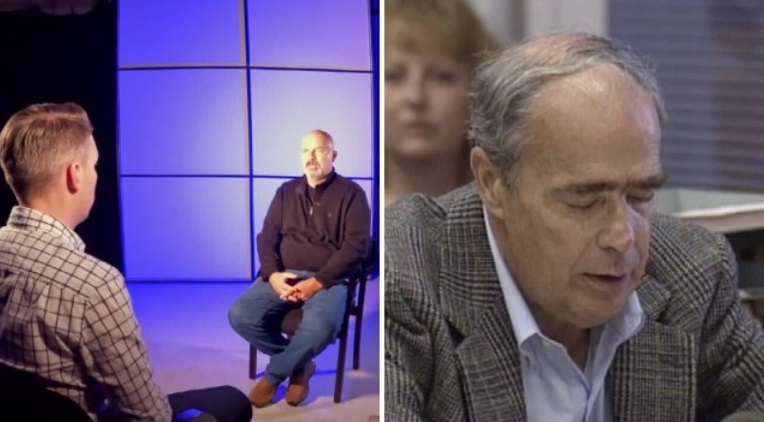MILWAUKEE (WI)
WTMJ-TV [Milwaukee WI]
February 15, 2022
By Shaun Gallagher
[Photo above: Left: Peter Hoell in an interview with TMJ4 News. Right: William Effinger. Original article includes video and a timeline. The video includes a map of Effinger’s assignments. We have reproduced that map below, with two other assignments noted, as documented in the released Effinger file.]
“If I can only help one person, it’s worth it to me to open up to the public about my situation.”
Zipping up his sleeping bag, a Sheboygan teen was restless, worrying about what was to come.
“He’d go from sleeping bag to sleeping bag. I’d learn to flip over on my stomach so he couldn’t touch me.”
Former Germantown Police Chief, Peter Hoell, is speaking out publicly for the first time about the sexual abuse he faced as a teenager in Sheboygan. More than four decades ago, Hoell says a Holy Name Parish Priest, William Effinger, sexually molested him several times, taking advantage of him and his friends by feeding them alcohol.
“Dirty, disgusted, afraid,” Hoell says of how he felt after the abuse. “I should have told my parents, but I didn’t. I was just too afraid. I didn’t know what was going to happen. Would they believe me?”
It was a strategy Effinger used over and over again, according to documents on the Archdiocese of Milwaukee (AOM) website. In 1993, Effinger’s abuse was publicly addressed; a family brought forward accusations of him molesting their 13-year-old son. Effinger went to trial and pleaded guilty. He was sentenced to 10 years in prison, but only served three after passing away from colon cancer behind bars in 1996.
“I’m sorry to say, but I was very happy,” Hoell said. “I was very happy that he died in jail, where he belonged. What made me smile is that he has to meet his maker. What’s he going to say? How is he going to explain all the people he’s damaged?”
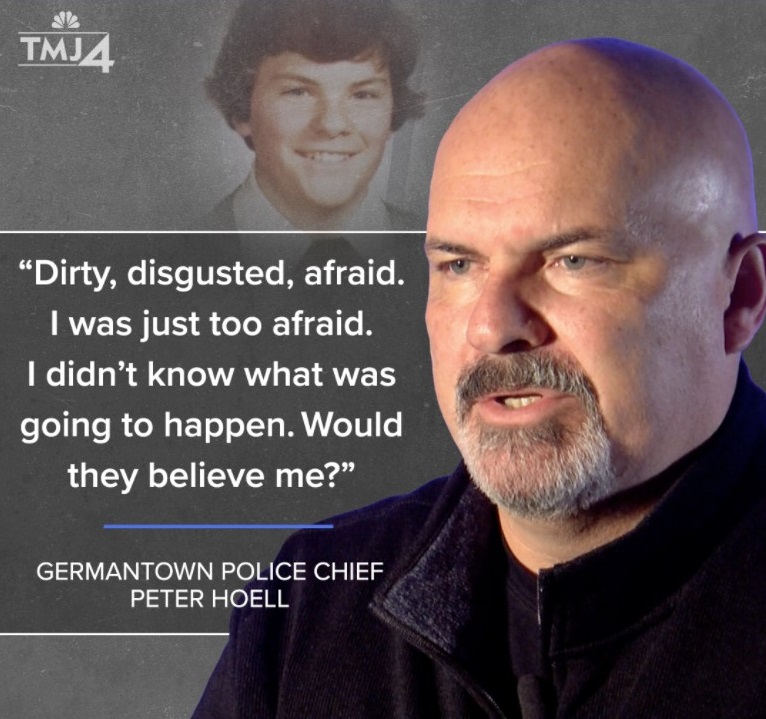
Impact of the Abuse
Hoell would go on to serve the Germantown community for 31 years, including 16 years as Police Chief. He retired in 2020. His experience, surviving the abuse, fueling his drive to turn things around and provide safety and security for others.
“The cliche is helping people,” Hoell said. “It really gives you a great opportunity to help people.”
Though Hoell retired in early 2020, he’s continuing that lifelong mission of helping people. He always posted on the Department’s Facebook Page while he was serving as Chief but decided to keep that going after he retired. He frequently posts tips and advice to keep the public safe. On December 1st, he took to his Facebook page to share the most personal story he has.
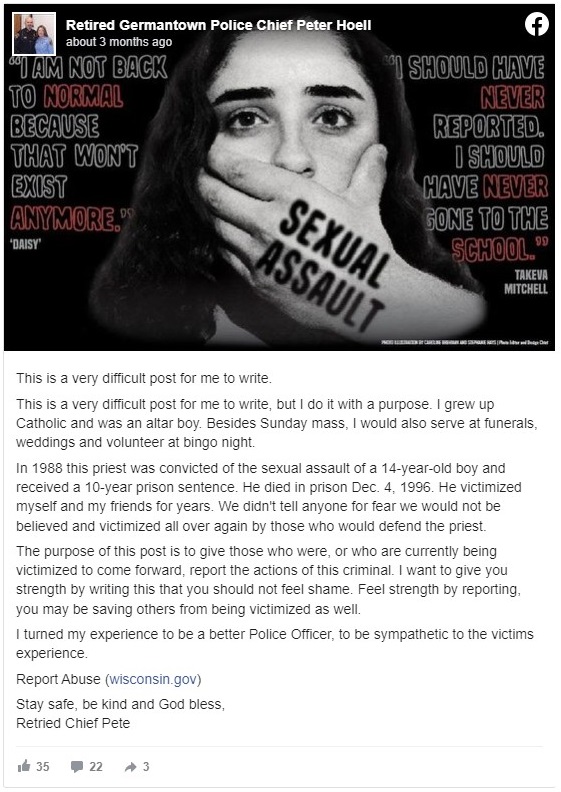
“I thought, if I could share my experience, I would have people listening,” Hoell said. “Because, I was the victim. The Chief of Police, the Former Chief of Police was the victim. Maybe people would listen.”
He says the decision to speak out now just felt right. He hopes to encourage any other sexual abuse survivors to feel confident in coming forward to share their stories.
“I feel I have the strength and courage to speak out,” Hoell said. “If I can only help one person, it’s worth it to me to open up to the public about my situation.”
“It was beyond imagination,” Peter Isely with Ending Clergy Abuse said. “It was never a possibility that a priest would sexually assault you.”
Isely is a survivor as well. He commends Hoell for speaking up now. Isely says he first started talking about his abuse publicly at 29-years-old, more than 10 years after it happened.
It hasn’t been an easy admission for Hoell. Now in his mid-50s, recalling the abuse brings him back to his childhood. His hands clammy with anxiety, he explains how the abuse impacted him then, and still impacts him now.
Over the years, it’s caused emotional problems for Hoell.
“It’s very deep,” Hoell said. “It cuts deep. It’s not something you can totally get over. Everyone handles it at their own pace. That’s what I did.”
Because of everyone going at their own pace, the age where survivors of sexual abuse speak out varies greatly. According to Child USA, a non-profit focused on preventing child sexual abuse, this kind of reporting is known as delayed disclosure. Essentially, the time between when the abuse happened and when those survivors speak up about it is significant.
“Studies have shown, the average is about 21 years for some people,” Carter Timon, Social Science Director for Child USA said. “It can be up to 49 years though. Some of them tell in five years, some of them tell in the average, 21 years and some of them, it could take 50 years. But a third of people take it to their graves. They never disclose.”
A German study among sexual assault survivors found the average age they come forward is 52.2 years old.
While it took about 10 to 15 years before Hoell said anything about the abuse, at 55-years-old, he’s speaking about it publicly for the first time. Ironically enough, the first time he addressed it was with a priest when he was trying to have his daughter baptized. When a priest asking questions about why he hadn’t been to church for an extended period of time, he opened up to the priest and told him about what happened.
Hoell had been away from the church for all of his adult life to that point. He considers himself spiritual, a believer in God, but he wouldn’t attend church. Sure, he’d go on holidays, for funerals or weddings. But overall, the church was tainted to him. To this day, even the smell of a church triggers painful memories.
“The church uses a particular scent of incense,” Hoell said. “When I smell that, I get very uncomfortable. It’s something I can’t control. I smell it, and I get very edgy.”
Over time, Hoell shared his story with those who were absolutely closest to him, namely his wife and his parents, maybe one or two fellow police officers briefly. Publicly, many didn’t know Hoell was carrying this burden.
They didn’t have to know explicitly because it came out in how he approached his job to protect and serve.
“It shaped my sensitivity stronger,” Hoell said. “I had a pretty good understanding about why sometimes people didn’t report things at all or didn’t report them in a timely manner. It can be frustrating because if it’s not reported in a timely manner, you can lose evidence. But I understand that. I never got upset over that. I get why they waited or were hesitant. They’re afraid of being revictimized, afraid people won’t believe them.”
Overall, Hoell tried to use the pain to make sure he could do everything in his power to prevent other children from feeling the way he did.
“I want to grab it and use it to do better and help others,” Hoell said. “It did take something away from me. It created some emotional problems for me. It still does. But I decided the glass was half full and try to use that to help other people.”
Effinger’s MO for abuse
A known alcoholic within the church, Effinger would offer beer to children after they volunteered at events. It was an appealing offer for Hoell as a kid.
“I thought at the time, it was great,” Hoell said. “Drinking a beer at 12-years-old, having fun. But afterwards, it became very scary.”
Hoell says one beer turned into two, into three and so on. It would get to the point where he and the other boys were very drunk. Drunk enough for Effinger to take advantage of them.
“He’d get us drunk and we’d all go to sleep in sleeping bags,” Hoell said. “They were so intoxicated, I don’t think they were aware of what was going on. He allowed us to stay in the gym overnight, so he had a motive. He had a plan, in giving us the beer. There’s also the fact that he’s a priest, a very intimidating figure when you’re a 12-year-old child. He was taking advantage of a situation.”
Parents in Sheboygan raised concerns in 1983, nine years before Effinger was criminally charged. Officials with the church were notified that Effinger would allow 10 or 12 young boys to sleep over at the parish and drink alcohol. While the parents said they were not aware of any sexual activity, the Church had been made aware of at least two different accusations in 1979 and the School Principal was aware Effinger brought boys up to a cottage on vacation.
A prolific predator, Effinger was transferred to four different Wisconsin Parishes between 1972 and 1979, finally landing at Holy Name Parish in Sheboygan. It wasn’t too long after he arrived at Holy Name that Hoell remembers being abused.
“It was a sexual assault touching, that’s as far as it went, touching,” Hoell said. “The first time I experienced it, I was in shock. I didn’t know what to do.”
The first time wasn’t the last time. For the next two years, there were a handful of assaults. Hoell still has unanswerable questions about why he went back.
“It’s difficult for me to comprehend,” Hoell said. “Why the next Friday or following Friday, we’d do it all over again? I don’t understand why we did that, but we did. We did have a good time but didn’t think of the consequences afterwards. A lot of kids who are abused have that problem because it’s a family member or someone they know that’s close to the family and they’re afraid.”
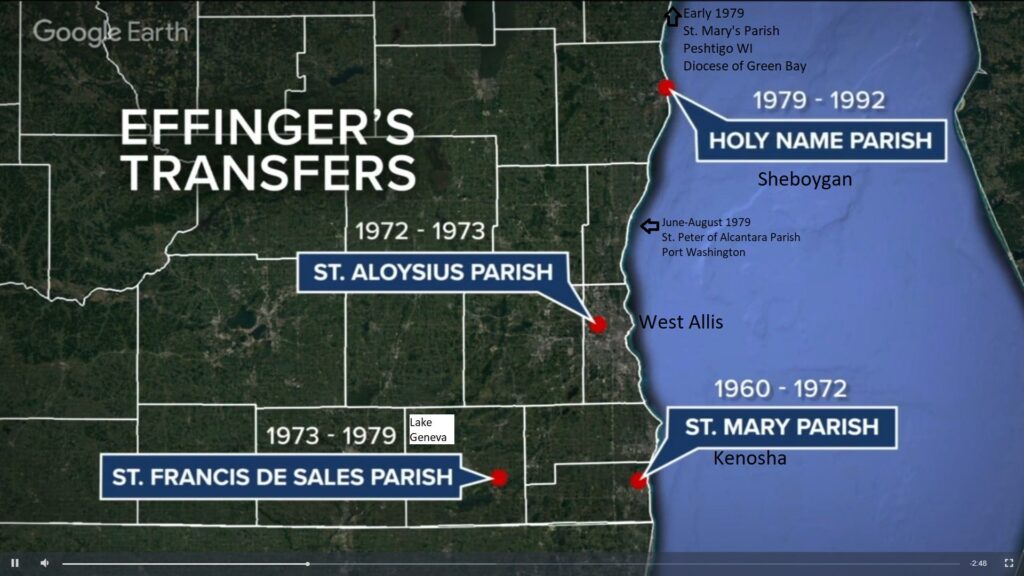
William Effinger: A Timeline of Repeated Abuse
Effinger was a well-known predator. Over the course of nearly 20 years, Effinger was transferred to four different Wisconsin parishes. All but one has a substantiated claim of sexual abuse, dating back as early as 1965.
The AOM declined an interview for this story but provided a statement, denouncing Effinger’s abuse.
“Fr. Effinger’s acts were criminal and destructive to his victims. He took advantage of his position of authority and trust, going against everything the priesthood stands for. He was convicted of sexual assault, and died in jail in 1996.”
In total, at least 29 reports of abuse were made in the 1990s, including at least 16 individuals who came forward with substantiated claims of sexual abuse by Effinger, according to online records. He was only convicted in the one case.
Accountability in the Church
The AOM says it has done more than any other organization in the United States to address and prevent sexual abuse. They say they continue to make sure the parishes and schools are safe places.
“The AOM is the largest provider of Safe Environment sexual abuse prevention training in the state with more than 90,000 staff and volunteers trained. The training, and a criminal background check, are required for all parish and school staff and for volunteers who have contact with minors. We’ve also provided ongoing outreach to abuse survivors, paid for counselling, and maintain an independent reporting system. We encourage anyone who has been a victim of sexual abuse whet
her it was a priest, family member, teacher or coach to come forward and report the abuse to authorities.”
The AOM also keeps a list online of “restricted priests” who have had their clerical titles stripped. Effinger is among 48 men on the list. The website is very thorough on each and every case, providing the Church’s timeline of an investigation, media reports and more.
The AOM filed for bankruptcy in 2011 as a result of lawsuits filed against them for sexual assaults. In an effort to make things right, they sought to notify all survivors. In response, they received 578 claims of sexual abuse. The AOM says 99 percent of these claims filed happened before 1990.

That’s the same time frame as Hoell and Isely.
However, Timon says it’s likely there are people who have been abused who have yet to come forward.
“If somebody was abused in the 90s, they might come out about it now,” Timon said. “It may come out in 20 years and, again, they may never come out of that. But I think it’s entirely plausible that there are plenty of people who we still haven’t heard from who have been abused in the Catholic Church and it may have happened recently.”
The AOM points to its efforts to stop abuse as the reason fewer claims were made in the 80s, 90s and 2000s.
The AOM saying, the lower reports of abuse, “does not mean people are waiting until they are older to report because there would be people who reach an older age at every point in time.”
“I don’t know if the rates will outpace the 70s and 80s,” Timon said. “But I can tell you right now, there is no doubt in my mind that the rates we’re seeing for people from even the late 90s up through now are undercounts in reporting.”
The AOM pointed the I-Team towards child sex abuse happening in other institutions, like athletic teams and the educational system. They also acknowledged the increase in sex trafficking as a problem. According to the Rape Abuse and Incest National Network (RAINN), 57,329 children were victims of sexual abuse in 2016, the most recent year of statistics.
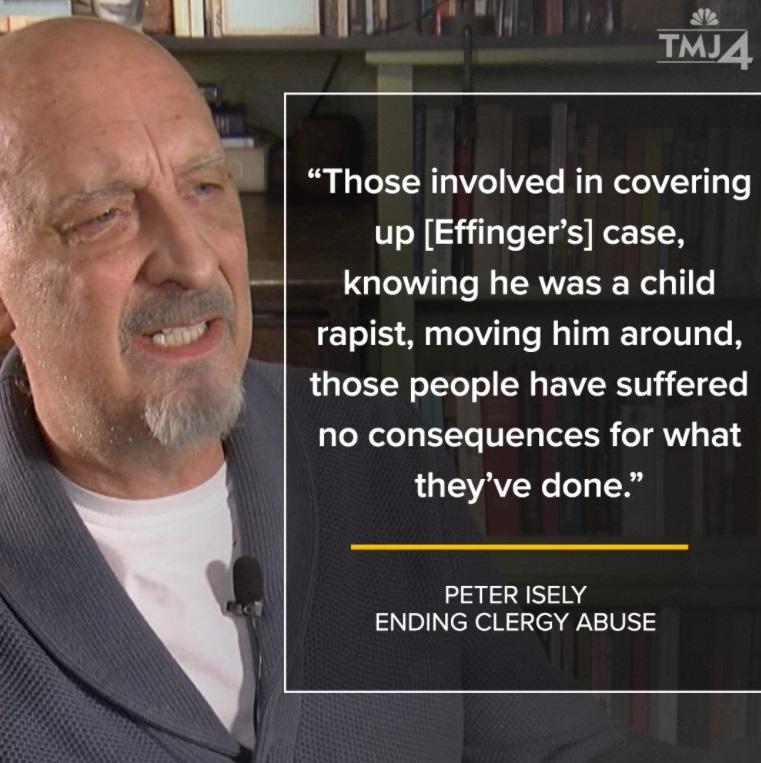
However, Isely feels the AOM is pointing the finger and believes they have not done enough internally. He says more has to been done to hold the AOM accountable for the past.
“That’s your ethical and moral act to those that you have harmed?” Isely said. “That’s the problem. Your organization harmed these individuals. You, at minimum, take responsibility for what you’ve done. With Effinger, those involved in covering up his case, knowing he was a child rapist, moving him around, those people have suffered no consequences for what they’ve done.”
Wisconsin Department of Justice Intervention
From a state level, Attorney General Josh Kaul is looking to do just that. In spring of 2021, he opened a new inquisition to investigate what’s being done to prevent institutional sexual abuse and looking for any new survivors willing to share their experiences.
“There are a number of survivors who continue to be impacted and continue to deal with the trauma from abuse,” Kaul said. “Making sure that they have a safe, trusted place to report is really important.”
The Department of Justice created a website for survivors to report their abuse. They can do so anonymously online and it also offers the chance for those survivors to receive help if they need it.
“We want to connect survivors who are interested in being connected with victim services professionals,” Kaul said. “If they want to talk to those professionals as part of the healing process, they can do so. If a potential investigation or prosecution could happen from there, they provide that information to local law enforcement or a prosecutor. Even if there’s not a potential prosecution that could be brought, say because the statute of limitations has expired, we’re still collecting that information so that at the end of this process, we can provide an overview of the information we received and identify potential changes that can prevent future cases.”
To date, they have received more than 180 reports and last month, Isely, along with advocates from Nate’s Mission, another advocacy group looking to stop clergy abuse, dropped off thousands of pages of documents to the Attorney General and local District Attorneys in Milwaukee and Green Bay.
However, the AOM opposes the investigation. In a letter acquired by the I-Team, the AOM’s attorney says the Attorney General’s investigation will not lead to healing, but further victimization.
They say there hasn’t been any other substantiated claims they are unaware of. After Isely and Nate’s Mission dropped off documents to various legal entities, the Church said, “The AOM publishes the names of diocesan clergy with substantiated allegations of sexual abuse of minors on its website and has done so since July 2004. No information about additional substantiated allegations has been received from the attorney general, the district attorney or any other source.”
On Feb. 3, the Attorney General announced it’s first substantiated finding from its Clergy and Faith Leader Initiative. Remington Jon Nystrom, 33, was charged with one count of First-Degree Child Sexual Assault – Contact with a. child Under Age 13.
According to the release, the incident happened in 2009 while Nystrom was working as a counselor at a church camp in Waushara County. The criminal complaint does not suggest what church Nystrom or the camp was connected to.
“This case is possible because of the report made by a brave survivor and the diligent work of investigators, victim service professionals, and prosecutors,” Kaul said in a press release. “We continue to ask anyone with information about clergy and faith leader abuse to make a report to the Wisconsin Department of Justice.”
Finding Help
Efforts like the Attorney General’s are part of the motivation behind speaking out for Hoell. While he has come to terms with what happened to him, he knows there are others who haven’t felt ready yet.
“I feel I have the strength and courage to speak out,” Hoell said. “At the time, I was trying to keep it in the past and I didn’t want to dwell on. The whole reason I bring this up now is because if I can only help one person, it’s worth it to me to open up to the public about my situation.”
While he does feel strong enough to speak up now, it isn’t without trepidation. Hoell admitted, talking to the I-Team brought about anxiety. But he still did it and he wants other survivors to know, they can too.
“I’d say, have the courage to do so,” Hoell said. “Go to a parent, go to a friend. Maybe you have a really good friend to be with you when you talk to your parents. Whatever situation makes you comfortable to report it, but it’s so important to report it. Even if it’s anonymous. There are hotlines to call to talk about it. Maybe they provide information to give the strength to report that crime.”
In addition to the DOJ’s website to send tips anonymously, survivors or those who have information about survivors, can call 1-877-222-2620 to submit tips as well.
